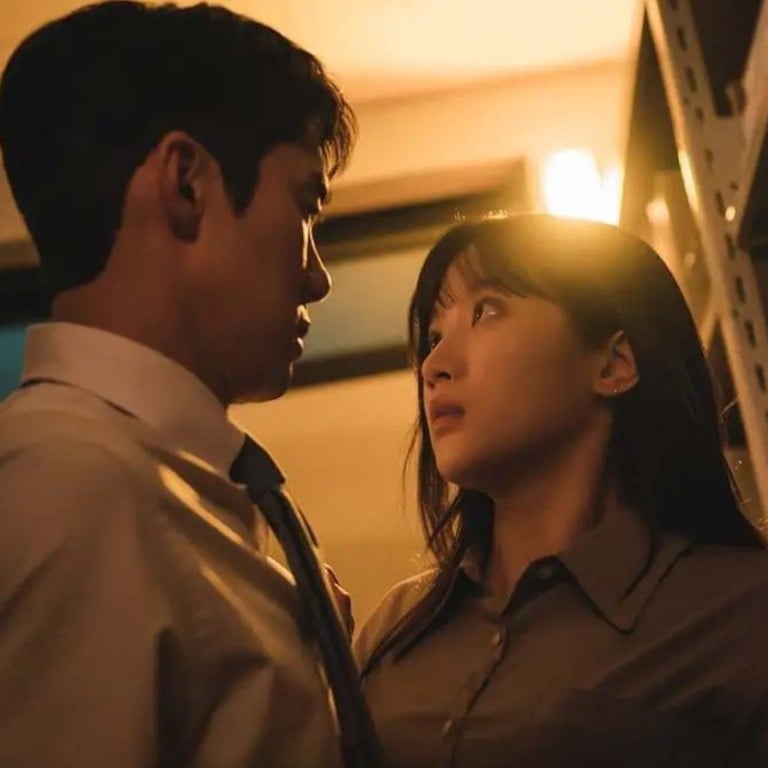
Netflix show The Interest of Love looks at Korea’s office politics and social ranking among bank employees seeking romance
- Lowly bank clerks look for love amid Korea’s rigid social ranking in Netflix K-drama The Interest of Love
- Meanwhile on Apple TV+’s Shrinking, Harrison Ford’s grumpy psychotherapist Dr Paul Rhodes deals with his colleague’s problems including a feisty teenage daughter
The old and new versions of the British class system have cousins in Seoul. That’s if The Interest of Love (Netflix; three stars) is telling the truth about life at the KCU Bank’s Youngpo branch.
The first series (now finished) wastes no time in declaring that class-based discrimination towards customers has given way to modern, wealth-based bias – an attitude echoed in the rigid social ranking that regulates employees’ lives.
So the awkward stage is set for potential romance between low-level clerks Ha Sang-su (played by Yoo Yeon-seok) and Ahn Su-yeong (Mun Ka-young).
Ha starts out as a bumbling rookie; she is already known throughout the company as the Goddess of Youngpo, although a better name might be Cynical Ice Maiden, so cold-hearted does she appear to possible suitors.

What soon develops in the claustrophobic atmosphere of the workplace, where everyone knows everything about everybody else (or thinks they do), is not so much a love triangle as a love square.
The frustrated, embarrassed yet smitten Sang-su, seemingly debarred from showing anger by social niceties, discovers that Su-yeong is purportedly dating bank security guard Jeong Jong-hyun (Jung Ga-ram).
Kokdu: Season of Deity – Im Soo-hyang, Kim Jung-hyun in fantasy K-drama
But spice is sprinkled on proceedings by Park Mi-gyeong (Keum Sae-rok), who arrives to take up a senior position.
She still has a crush on Sang-su from their college days and makes it plain that she thinks they should be together, whereupon the mystery of what the heart really wants, as opposed to what the head dictates, takes over.
Sang-su, pining for Su-yeong – uneducated, from a relatively poor background and content with “an average, ordinary life” – stalls when it comes to Mi-gyeong, who is confident, ambitious, wealthy and just as alluring as Su-yeong. All of which makes the agonised viewer want to shake Sang-su until he comes to his senses.

At times, the behaviour of these otherwise responsible adults seems scarcely credible: all have difficulty in expressing emotion, explaining their circumstances and seizing the initiative, with only Mi-gyeong unafraid of intimacy and avoiding the stilted dialogue that plagues the other three and often renders them misunderstood.
Redressing the show’s watchability balance, however, are the other office staff, especially the bunch of bitchy, intrusive male gossips, plus the cleverly constructed cliffhanger that concludes each lengthy episode.
But will any of the putative lovers ever make a serious move? They might all work in a bank, but they don’t know the meaning of “speculate to accumulate”.

Head doctors
From clamming up to chronic oversharing in Shrinking (Apple TV+), in which the ever-lugubrious Harrison Ford does comedy for the first time – on television, that is.
Not that the fact that he excels at it should be surprising, considering his movie résumé. Here, Ford is psychotherapist Dr Paul Rhodes, boss of a Los Angeles practice that includes Jason Segel as Jimmy Laird.

Jimmy, poignantly, is trying to keep his life on the rails while mourning his wife and bringing up (with the help of solicitous neighbours) feisty teenage daughter Alice (Lukita Maxwell). Paul, dealing with his own difficulties, is unfailingly grumpy, sarcastic and droll, sometimes simultaneously, when it comes to his underlings, yet more soft-centred than he will admit.
The unofficial beneficiary of Paul’s wisdom is often the amusingly forthright Alice, although she remains much more “together” than her father. Which brings us to the series’ essence: the use of humour (particularly of the mortifying-moment kind) to overcome pain.
Its message, meanwhile, might be summed up as a variation on “physician, heal thyself”, because Jimmy’s therapy needs are of the sort met, on occasion, by a 3am pool party with hookers.

